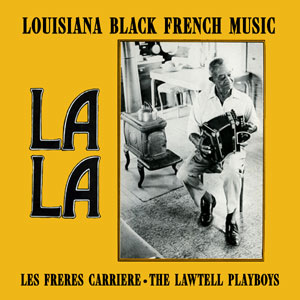Carriere Brothers & Lawtell Playboys
“La-La Keepers & Creole Torchbearers”
Quick Intro
Carrière Brothers & Lawtell Playboys are foundational figures in Louisiana’s Creole music tradition. Their collaborative album La La: Louisiana Black French Music, released on Maison de Soul Records, documents the raw, rhythmic style of la la—the rural French-language dance music that predates zydeco. With deep roots in Lawtell, Louisiana, their music preserves the sound and soul of Black Creole heritage.
In-Depth Profile
Bébé (Joseph) Carrière and Eraste Carrière, known as the Carrière Brothers, were born and raised in Lawtell, Louisiana, where they learned traditional Creole music from their father, Ernest Carrière. Eraste played accordion and Bébé played fiddle, forming the Lawtell Playboys in 1946 and performing at house dances, trail rides, and local venues including Slim’s Y-Ki-Ki. Their style—known as la la—blended French vocals, blues phrasing, and rhythmic two-steps, capturing the essence of rural Creole life.
In the 1970s, folklorist Nick Spitzer recorded the Carrière Brothers and their band in Lawtell, resulting in the landmark album La La: Louisiana Black French Music, released in 1977 on Maison de Soul Records and later reissued by Folkways. The album features raw, unfiltered performances of Creole standards like “Zydeco à Carrière,” “Robe à Parasol,” “Blue Runner,” and “Bosco Stomp.” The second half of the album showcases the Lawtell Playboys—led by Eraste’s son Calvin Carrière and accordionist Delton Broussard—performing songs such as “Eunice Two Step,” “Lucille,” and “Ye tou’ mandé pou’ toi.”
Though Eraste retired from performing in the 1960s, the Lawtell Playboys continued under Calvin’s leadership, with musicians like Goldman Thibodeaux carrying the tradition forward. The group’s legacy is rooted in community, storytelling, and cultural preservation—keeping alive the sound of Creole Louisiana through fiddle, accordion, and French lyrics.
La La remains one of the most important field recordings of Louisiana Creole music, praised for its authenticity, historical value, and emotional resonance. It introduced la la to new audiences and cemented the Carrière family’s role as stewards of Louisiana’s Black French musical heritage.
Signature Tracks
- “Zydeco à Carrière” – A driving accordion-led two-step that exemplifies the raw energy of la la music.
- “Robe à Parasol” – A playful Creole dance tune with fiddle and French vocals.
- “Blue Runner” – A rhythmic standout with blues phrasing and traditional instrumentation.
- “Bosco Stomp” – A classic stomp tune rooted in Creole fiddle tradition.
- “Eunice Two Step” – A lively dancehall favorite performed by the Lawtell Playboys.
- “Ye tou’ mandé pou’ toi” – A soulful French-language ballad with emotional depth.
Notable Accomplishments & Awards
- La La: Louisiana Black French Music (1977) – Released on Maison de Soul Records, later reissued by Folkways; considered one of the most important field recordings of Creole music.
- Featured in Smithsonian Folkways Archives – Recognized for cultural preservation and ethnographic significance.
- Nick Spitzer Field Recordings – Captured by renowned folklorist and radio host of American Routes.
- Legacy Carried Forward – The Lawtell Playboys name continues under Goldman Thibodeaux, preserving the Carrière family’s musical tradition.
Reviews
La La: Louisiana Black French Music
OffBeat Magazine — Written by Dan Willging (June 2012)
“A vivid, long-overdue window into rustic la-la—the forerunner to modern zydeco.”
Folklorist Nick Spitzer made these home recordings of Les Frères Carrière and the Lawtell Playboys in 1976 that were released commercially the following year. On the eight tracks featuring Les Frères Carrière, Eraste (accordion) and BéBé (fiddle), it’s easy to ascertain zydeco’s early roots: Afro-Caribbean with its intricate polyrhythms and Eastern European with a mazurka, and “Robe À Parasol” with very Creole lyrics. Additionally, there’s a Cajun influence with “Bosco Stomp” and “Valse à Cherokee,” though they’re rendered in more of a bluesy Creole style. Among the highlights are the pair of BéBé’s signature tunes, the pulsating “Blues À BéBé” and the hard-driving “Blue Runner,” that have been covered countless times since. When this recording took place, Eraste and BéBé had already been retired from the Lawtell Playboys for a decade. Eraste’s son, Calvin, another exemplary Creole fiddler, carried the torch for the group’s second incarnation and enlisted accordionist Delton Broussard, who added a few family members to the fold. The five tracks featuring the Lawtell Playboys are a tad more amped up than the acoustic-centric Les Frères Carrière, but they retain the quintessential feeling of rustic la la, the forbearer to modern zydeco. The haunting version of Big Joe Williams’ “Baby Please Don’t Go” was one of the Lawtell Playboys’ staples, and two more songs are Broussard originals. J.C. Gallow’s double syncopated rubboard rhythms are in-your-face prominent, as if there were a snappy tap dancer stomping on a hardwood floor. It was a different era then, and though this release is long overdue it couldn’t have come at a better time given zydeco’s ever-changing climate.

